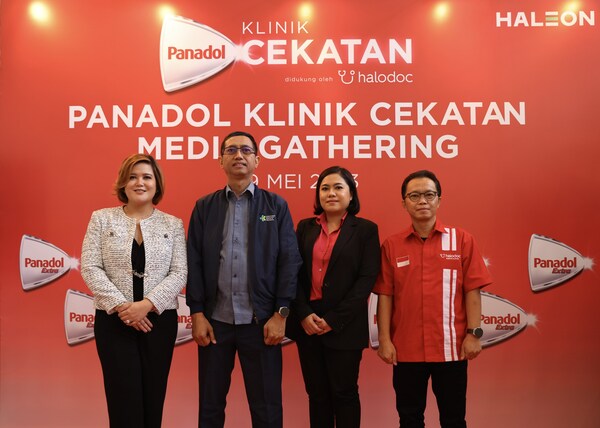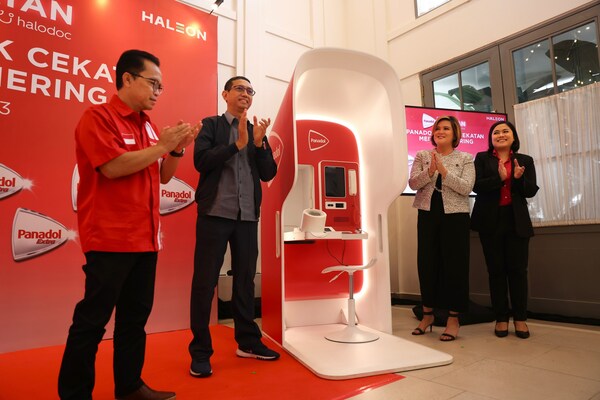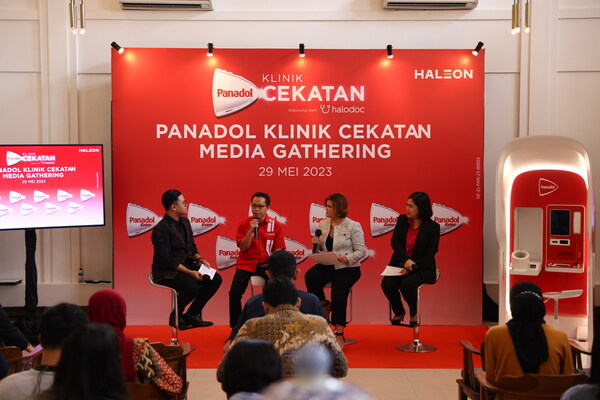- The extended program aims provide 10,000 free consultations across 16 villages in Cugenang district affected by 2022 earthquake
- The eight-week mobile clinic services program to deploy pilot Pain Phone unit to facilitate telehealth consultation
JAKARTA, Indonesia, May 29, 2023 /PRNewswire/ — Following the success of the Panadol Klinik Cekatan initiative, Haleon, a global leader in consumer health and maker of Panadol, and Halodoc, one of Indonesia’s leading digital health ecosystem, revealed their next stage in tackling medical care access barriers through their mobile clinic services partnership. The extended program aims to reach people with limited mobility and access to medical consultation and treatment, focusing on the people affected by the November 2022 Cianjur earthquake. The mobile clinic services program will be aided by the Panadol Pain Phone, a first-of-its-kind telemedicine unit, bridging the distance between rural communities and medical experts using technology.

(Dari kiri ke kanan) Dhanica Mae Tiu (General Manager Haleon Indonesia), Setiaji (Chief of Digital Transformation Office Kementerian Kesehatan Republik Indonesia), Yudith Arianda (Marketing Lead Haleon Indonesia), dan dr. Irwan Heriyanto, MARS (Chief of Medical Halodoc) pada peluncuran program Panadol Klinik Cekatan Tahap 2 dan Telepon Panadol Cekatan.

Haleon, pemimpin global dalam kesehatan konsumen dan produsen Panadol, bekerja sama dengan Halodoc, mengumumkan peluncuran Telepon Panadol Cekatan di Jakarta hari ini (29/5). Terinspirasi oleh telepon umum konvensional, unit telehealth ini memiliki fitur seperti layar video untuk interaksi tatap muka dan sensor pengukur detak jantung, tekanan darah, suhu, dan kadar oksigen. Teknologi tersebut akan digunakan pertama kali di Cianjur untuk menjangkau komunitas yang terkena dampak gempa 2022.

Menyusul kesuksesan program Panadol Klinik Cekatan, Haleon, pemimpin global dalam kesehatan konsumen dan produsen Panadol, bersama Halodoc, terus meningkatkan akses perawatan kesehatan bagi masyarakat Indonesia di pedesaan. Perluasan program ini mencakup peluncuran Telepon Panadol Cekatan, yang menyediakan upaya preventif dan kuratif melalui konsultasi medis, resep dokter, dan pengiriman obat.
With 43% of Indonesians living in rural areas[1], access is a key consideration when having to choose between enduring the physical and emotional burden of pain or making a long journey to get medical care. Among these rural communities, people displaced by the earthquake may find themselves in a more dire situation as they face not only access barriers due to poor road conditions, but are also potentially undergoing skin problems, respiratory infections and digestion issues as current living conditions in temporary tent housing also limit access to clean water. In recognition of the emergent situation, the eight-week Panadol Klinik Cekatan program, complemented by the Panadol Pain Phone, will be deployed to reach 10,000 people across 16 villages in the Cugenang district, providing both preventive and curative measures through medical consultation, treatment prescription and medication delivery.
Similar to the free consultations and medicine provided by the mobile clinic teams, the Pain Phone is designed to enable medical consultation and vital signs checks, while the accompanying medical team assists patients with its use as well as distribution of basic medication. The mobile telehealth unit incorporates key devices to make the consultation personal and reliable through a video screen for face-to-face interactions, as well as sensors that measure metrics such as heart rate, blood pressure, temperature, and oxygen levels. The unit is also intended as a test-and-learn pilot program with improvements and adjustments to be made for subsequent phases based on learnings from the field.
Setiaji, Chief of the Digital Transformation Office, Ministry of Health, said: “Through the six pillars of transformation, we believe that digitalization is one of the keys to making healthcare more inclusive. The Panadol Klinik Cekatan and Pain Phone program by Haleon and Halodoc is a real example of how we can participate in accelerating health access throughout the country and making healthcare and health education accessible to more people.”
Dhanica Mae Tiu, General Manager, Indonesia, Haleon, said: “At Haleon, we are committed to do more to tackle barriers that stand in the way of people’s better everyday health. We do so by understanding what holds people back from better everyday health so we can include them in opportunities to improve their health and that of their loved ones. Enabling easier and faster access to medical care is critical when millions of Indonesians are found to be delaying treatment because medical care is too far away for them. Through our continued and concerted efforts with Halodoc, we remain focused in bringing access to affordable and high-quality health care as well as empowerment through self-care promotion – this time using technology to bring remote consultation solutions to rural communities as well as people direly affected by the earthquake.”
dr. Irwan Heriyanto, MARS, Chief of Medical Halodoc, explained, “There is a need to continue our efforts to enhance public health literacy in Indonesia, specifically in smaller cities and underserved communities. Hence, apart from providing free health consultations and basic medication, Halodoc supports Panadol Klinik Cekatan by providing education on the importance of basic healthy lifestyle and self-care treatment. The introduction of the Pain Phone service is yet another step forward in our collaborative outreach efforts with Haleon to simplify access to healthcare through technology. We hold an optimistic view that this partnership can play a significant role in improving the overall health of Indonesians.”
To date, the Panadol Klinik Cekatan program has made over 7,000 free consultations, connecting people with experts to diagnose their pain, including those suffering from headaches, joint and muscle pains, as well as conditions such as hypertension, anorexia, and asthma, which can be life-threatening conditions if treatment is delayed. As the partnership continues, more outreach efforts are planned to expand the mobile clinic’s coverage to other rural areas and help bridge the access gap for more people across Indonesia.
[1] Source: The World Bank, 2021 https://data.worldbank.org/indicator/SP.RUR.TOTL.ZS?locations=ID |











